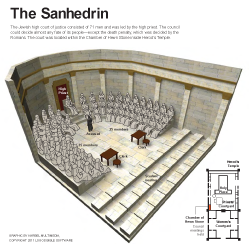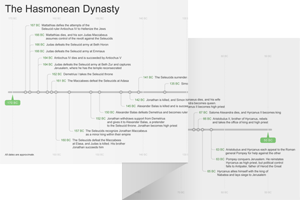11:1 Bethany Located roughly half a mile east of Jerusalem on the eastern slope of the Mount of Olives.
Mary The sister of Lazarus. Mary sits at Jesus’ feet to learn in Luke 10:39, a scene that occurs prior to this one.
 The Role of Women in John’s Gospel
The Role of Women in John’s Gospel
Martha Lazarus’ other sister. Martha is depicted as being anxious to be hospitable to Jesus and His disciples in Luke 10:38–42. See note on Luke 10:41.
11:3 Lord See note on John 13:6.
whom you love is sick Lazarus is not yet dead when Jesus hears this report.
11:4 not to death Jesus predicts that Lazarus will not die in the sense that he will not be permanently dead.
glory of God The greatness and glory of God will be shown so as to bring Him acknowledgment and honor.
 Doxa Word Study
Doxa Word Study
Son of God See note on Matt 4:13; and see note on John 1:34.
may be glorified This circumstance will demonstrate Jesus’ greatness as well as God’s.
11:9 twelve hours Jesus is referring to the average number of hours of sunlight in the summer in Jerusalem.
the light of this world Refers to Jesus. Light was a common metaphor in Judaism for God’s providence and guidance. See 8:12.
11:10 light is not in him Jesus refers to God’s power to guide a person’s life through the Holy Spirit. In this setting, He is referring to Himself as their guide (see 14:16).
11:11 has fallen asleep A common metaphor for death, yet once again, Jesus’ disciples do not understand. This is likely because they thought Lazarus was still sick (v. 6).
11:15 that you may believe Jesus knows this situation can result in something good. He is intentional with His decision to use it to demonstrate His power (vv. 4, 6).
11:16 we may die with him Thomas shows enthusiasm to follow Jesus, a point that later becomes ironic (20:27).
11:22 God will grant you Martha is confident not just in Jesus’ ability to heal, but also in His power to do whatever He asks God. Her response in v. 24 to Jesus’ proclamation that He will raise Lazarus suggests she is not asking Jesus to raise Lazarus from the dead at this time—that would seem to be impossible.
11:23 rise again Resurrection is traditionally the first sign of the restoration of God’s people (Ezek 37:1–28; Isa 53:10–12; Dan 12:1–13; see note on Rom 1:4).
11:24 resurrection at the last day See note on Rom 1:4.
11:25 the resurrection and the life Jesus declares that He is the source and power that will enable the resurrection of the dead on the day of judgment, when God’s people will rise in glorified bodies to be one with Him. This parallels the breath coming into the bodies in Ezek 37:10.
will live The person who chooses to believe in Jesus will be resurrected on the last day. See note on Rom 5:9.
11:26 will never die forever The life that Jesus promises is eternal.
11:27 Christ See note on Mark 1:1.
11:32 would not have died Mary, like Martha, is convinced that Jesus could have saved Lazarus from dying if there had been an opportunity for Him to come (compare John 11:22). They are both unaware that Jesus intentionally waited for Lazarus to die so He could perform the miracle of raising him from the dead (see note on v. 4).
11:33 troubled within himself Although Jesus intended to use this situation as an example to glorify God, it still disturbs Him (v. 3). Jesus feels the pained emotions of one who has lost a friend, and He is sympathetic toward others who grieve.
11:37 opened the eyes of the blind In 9:1–6, Jesus declares that even blindness can be used for God’s glory (similar to the situation with Lazarus’ death) because it provides an opportunity for God’s work through Jesus (compare v. 4).
11:39 stinking already Indicates that Lazarus was not only dead but already decaying. A body that has not been embalmed begins to noticeably decay and smell after three days, especially when exposed to heat.
11:41 eyes above Jesus looks up not because God the Father is physically located above Him but because it was common to look to the heavens (the skies) when praying. He wishes for those who witness this event to realize that God the Father is the source of the miracle He is about to perform.
I give thanks Jesus does not begin His prayer by petitioning God to intervene; instead, He begins with thanks for what God has already done.
11:42 may believe that you sent me Jesus acknowledges that it isn’t necessary for Him to pray because He is already anointed with the power of God to give life. Instead, He prays to proclaim God’s greatness in the moment, just as He had told His disciples prior to Lazarus’ dying (v. 4).
Miracles Unique to John’s Gospel | ||
Water to Wine, 2:1–11 | Official’s Son Healed, 4:46–52 | Paralytic Healed, 5:1–13 |
Blind Man Healed, 9:1–12 | Lazarus Raised, 11:38–44 | Great Catch of Fish, 21:1–14 |
11:46 Pharisees See note on 1:24.
11:47 Sanhedrin See note on Mark 14:55.
many signs Jesus performs a series of signs throughout John’s Gospel so that people may believe in Him and have eternal life (see note on John 2:11). Here, the Pharisees do the opposite: They seek to find a way to end Jesus’ ministry because they fear losing their power over the Jewish people. Jesus confronts people in 4:48 about their insistence on seeing signs to believe.
11:48 Romans The Pharisees and Sanhedrin
and Sanhedrin are concerned about the empire’s perception of a ruler rising up among them. They are much more content with being ruled by a foreign nation, even though that was against God’s original plan for them (see Josh 23:3–7).
are concerned about the empire’s perception of a ruler rising up among them. They are much more content with being ruled by a foreign nation, even though that was against God’s original plan for them (see Josh 23:3–7).
11:50 whole nation not perish Caiaphas’ prophecy is correct: Jesus will die for the nation (Isa 53:6, 12). But his understanding of how the death will occur is incorrect. He is thinking in terms of other leaders, like Judas Maccabeus, and imagining Jesus as a martyred military leader.
and imagining Jesus as a martyred military leader.
11:52 would be gathered Evokes imagery of God’s people returning from exile in foreign nations, as well as prophetic imagery of God restoring His people—not only to their land but to relationship with Him (e.g., Neh 1:9; Joel 2:16; 3:2). Jesus is the facilitator of this work, though this gathering is spiritual, not physical.
11:54 Ephraim Near Jerusalem; the precise location is unknown.
11:55 Passover See note on John 2:13.
purify themselves It was customary for Jewish people to enter ritual pools prior to entering the temple or enjoying the Passover meal.

|
About Faithlife Study BibleFaithlife Study Bible (FSB) is your guide to the ancient world of the Old and New Testaments, with study notes and articles that draw from a wide range of academic research. FSB helps you learn how to think about interpretation methods and issues so that you can gain a deeper understanding of the text. |
| Copyright |
Copyright 2012 Logos Bible Software. |
| Support Info | fsb |
 Loading…
Loading…




